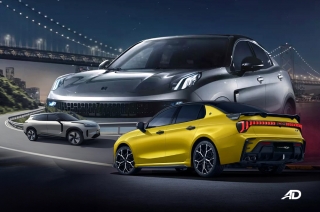
In the Philippines, more and more brands are offering turbocharged vehicles as answers to downsizing, better fuel economy, and reduced emissions. These turbocharged vehicles are designed to help provide power and torque similar to larger displacements but in a more compact package. At the core of turbocharged ownership lies a key component: the intercooler. Often overlooked yet utterly crucial, the intercooler plays a pivotal role in maintaining the turbocharged engine's efficiency and performance. Though, when exactly should you replace your intercooler?

Imagine this: you're behind the wheel of your turbocharged beast, accelerating through a series of twists and turns on a winding road. The turbocharger spools up, sending a surge of compressed air into the engine, generating an exhilarating increase in horsepower. Now, here's the catch. As air is compressed, it heats up significantly. This heated air isn't ideal for optimal combustion, as hotter air tends to lower the overall efficiency of the engine. Enter the intercooler, a sleek and often inconspicuous device that intercepts the superheated air, swiftly cooling it down before it enters the combustion chamber. This cooler, denser air means more power and efficiency for your vehicle. However, as with any automotive component, intercoolers don't last forever.

Understanding the life cycle of your intercooler is essential for maintaining peak performance. These unsung heroes are built to be durable, but over time, wear and tear can take their toll. Factors such as heat, pressure, and the occasional encounter with road debris can contribute to the gradual degradation of your intercooler's performance. The result? Reduced power output, sluggish acceleration, and even decreased fuel efficiency. If you've noticed these signs in your turbocharged ride, it might be time to investigate the health of your intercooler.

One of the telltale signs that your intercooler might need replacement is an increase in the engine's operating temperature. As the intercooler's cooling efficiency diminishes, the engine may struggle to maintain optimal temperature levels, resulting in potential overheating. This not only compromises performance but also raises concerns about long-term engine health. If your engine's temperature gauge consistently creeps into the danger zone, it's time to put the intercooler under the microscope.

Additionally, keep an ear out for unusual sounds emanating from the engine bay. A failing intercooler might produce hissing, whistling, or even rattling noises. These auditory cues often stem from leaks in the intercooler's piping, leading to loss of pressure and disrupted airflow. Ignoring these sounds can result in further damage to the engine and other vital components.

Visual inspection is another key factor in determining the condition of your intercooler. As you pop the hood and inspect the intercooler, look for any signs of oil or coolant leakage, which could indicate internal damage or deterioration. Corrosion, dents, and bent fins on the intercooler's surface can also hamper its efficiency. If you spot any of these issues, a replacement might be imminent to ensure your vehicle continues to operate at its peak.

Driving habits and environmental factors can play a substantial role in the lifespan of your intercooler. Frequent spirited driving, towing heavy loads, or modifications that increase horsepower can subject the intercooler to more stress, potentially accelerating its wear. Likewise, if you live in an area with extreme temperature fluctuations, your intercooler might deteriorate faster due to the constant expansion and contraction of its materials. In contrast, those using their turbocharged cars purely in the city might still see their intercooler still in great condition.

Ultimately, understanding when to replace your intercooler boils down to vigilance and preemptive maintenance. Regularly inspect your intercooler for signs of wear, especially if you're experiencing a decline in your vehicle's performance. Consulting your vehicle's manual and seeking guidance from automotive experts can provide valuable insights into the recommended replacement intervals for your specific make and model.
Latest Features
-
An all-electric future: The Porsche Macan Electric / Featured Article
Porsche’s Macan goes all-electric; it’s a new beast with an electrified heart, yet unmistakably Porsche in performance and spirit.
-
Which Kia should I buy? / Featured Article
We’re here to help you decide which Kia vehicle is best for you, whether it’s a sedan, crossover, or minivan.
-
Why Lynk & Co is a good option for luxury car buyers / Featured Article
Lynk & Co offers premium value for those exploring the luxury market.
Popular Articles
-
Electric Vehicles in the Philippines for under P1 million
Jerome Tresvalles · Aug 19, 2025
-
Top 3 Cars For Every Lifestyle—What Cars Are Right For You? | Behind a Desk
Caco Tirona · Apr 24, 2024
-
5 Tips to Maximize Fuel Efficiency
Jerome Tresvalles · Sep 09, 2024
-
Five driving habits that are draining your fuel tank
Jerome Tresvalles · Jun 24, 2025
-
Can engine braking harm your engine?
Jerome Tresvalles · Sep 11, 2025
-
Do electric cars even need maintenance?
Jerome Tresvalles · Oct 23, 2024
-
Best vehicles for an active outdoor lifestyle
Shaynah Miranda · Jul 25, 2024
-
How to drive different types of vehicle transmissions
May 23, 2024
-
5 easy ways to keep your car interior clean
Allysa Mae Zulueta · Nov 15, 2021
-
How to survive Metro Manila traffic
Earl Lee · Aug 16, 2022



